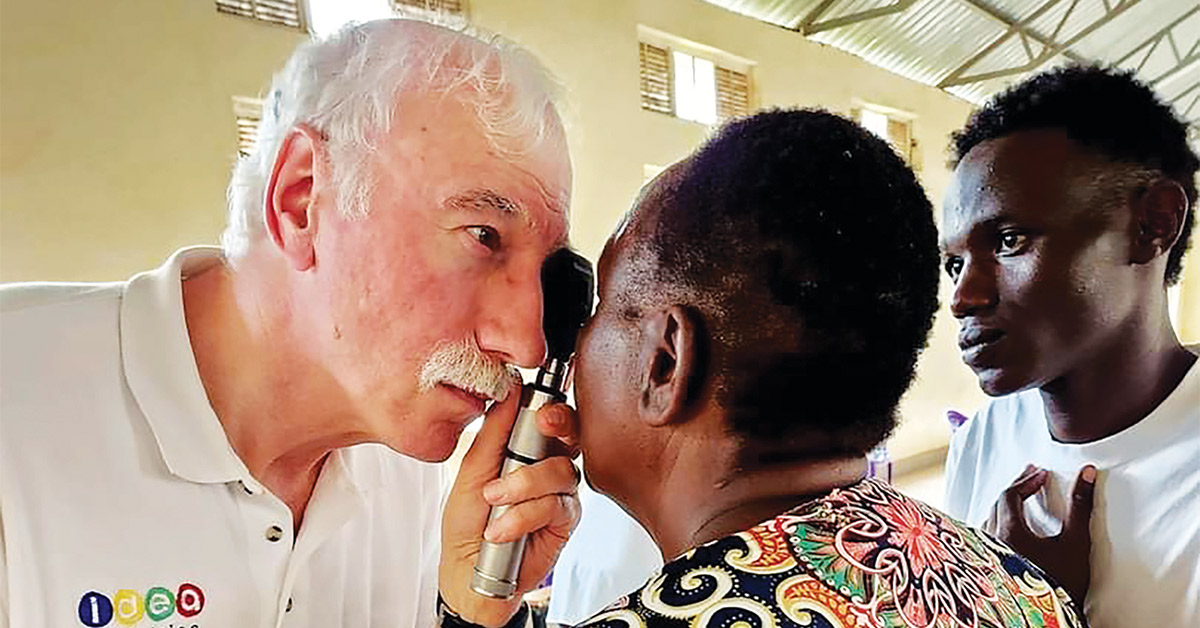
Ralph DeHaan examines a patient’s eye while in Kenya serving those in need.
The Central College family does good in the world no matter where they go. During her junior year at Central, Ellie Roorda ’24, a biology major with a Spanish minor, answered the call to do good in Africa alongside fellow Pella native, optometrist and loyal donor and friend of Central, Ralph DeHaan.
Small School, Big Connections
Roorda was looking for a small school experience and an overnight visit with members of the cross country and track and field teams sealed the deal — Central was the right fit.
She arrived on campus planning to study kinesiology and after guidance from and job shadowing opportunities set up by Katelin Valster, assistant professor of kinesiology, Roorda discovered optometry. So, she made the switch to a biology major in preparation for optometry school.
Roorda began working part time for an optometry office in Pella after her job shadowing experience. There, she learned of DeHaan and the mission trips his nonprofit arranges to provide optometric care to those in need. She was told there would be another trip coming up, so she reached out to get more information.
“I talked with Dr. DeHaan to learn about what the trip would entail and what I’d need to do in advance,” Roorda says. “I spoke with all my professors after I talked to Ralph and they all said they’d help me out and work with me. So that’s when I committed to going. I thought, ‘Okay, now’s the time.’”
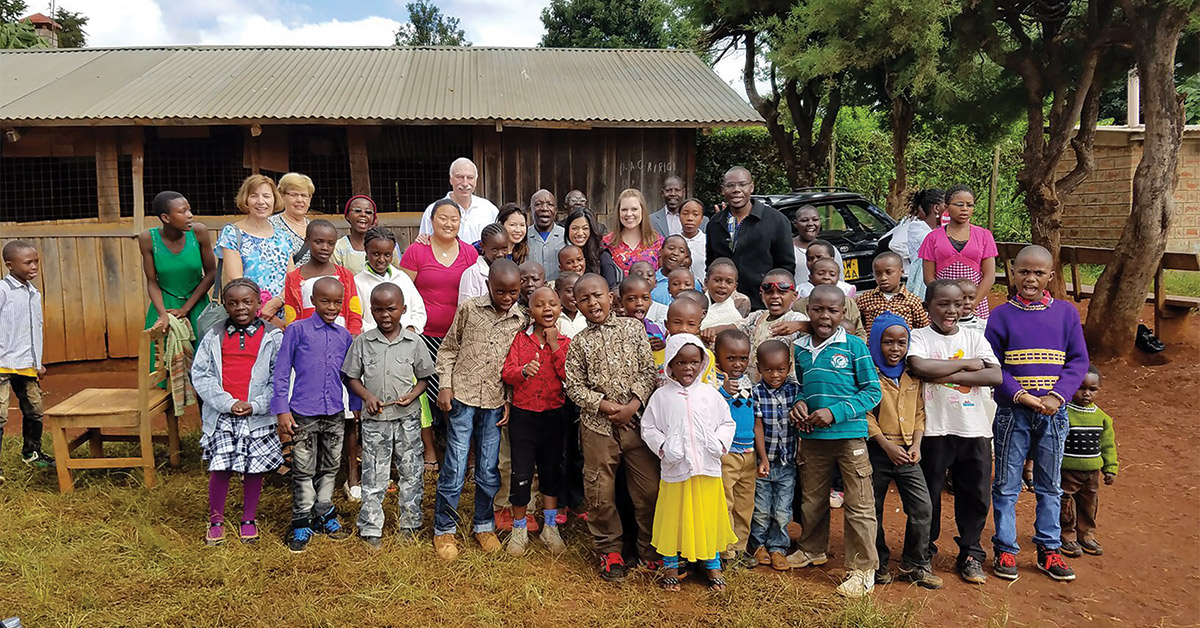
DeHaan and team pose with children of the Schikunga Children’s Home of Kenya.
How It Started
“I grew up here in Pella and married a local girl, Lu Ann Vermeer, after our third year of college,” DeHaan says.
After graduating from Calvin College, DeHaan went to work for a bank in Grand Rapids, Michigan.
“I found that I didn’t like banking quite as much as I thought I would,” DeHaan shares. “It just didn’t seem like the right fit.”
A conversation with an optometrist who banked at the branch was just the beginning. He asked if he could visit the office and ended up shadowing for half a day. He walked away ignited with passion and a hunger to learn more about optometry and the schooling required. After four years in school and the birth of his two eldest children, the couple moved back home to Pella.
In 1985, DeHaan joined the practice Wayne Vander Leest ’77 opened in town.
He knew Vander Leest would go to Mexico each winter on Volunteer Optometric Service to Humanity trips.
“He would come back telling wonderful stories about the experiences,” DeHaan says. “And I became interested in that, but I had two small boys at home. So, I let that go for a while and kept working. By the time my sons were a bit older, I went on one of those same kinds of VOSH trips.”
“I came across a mention of a fellow going on a trip from Michigan to Africa,” DeHaan recalls. “I contacted him and said my son and I were interested in going along for the trip. At that time, people were scared to travel there, and travel was not recommended as the embassy in Nairobi, Kenya, had been bombed in the previous months.”
“Seven of us went — three other optometrists, my son Matthew and a couple of other support people,” DeHaan says. “We helped quite a few people, but the key thing from that trip was meeting a local pastor. He and his wife and their children were wonderful people who had been called by God to go back to the poor villages where they grew up. We got to know them very well.”
This relationship stirred up something more in DeHaan and his son.
“In the evenings, Matthew and I would discuss what God was calling us to do there, how we could help and how we could make an impact in the area,” DeHaan says. “For both of us to drop everything, go to seminary and become missionaries ourselves was not going to be nearly as effective as working with this couple we’d befriended who were local people already doing missionary work there. That’s what we felt God calling us to do, so we did.”
Inspired by his trip to Kenya, DeHaan later founded Schikunga Children’s Home of Kenya and Assistance with Eyes, a 501(c)(3) organization (SCHOK & AWE).
“I chose that name because I thought it is kind of shocking that these white people from a Dutch farming community in the middle of the United States would be found in a poor village of Kenya, with people so different from us,” DeHaan explains. “I also liked that it referenced the children’s home and assistance with eyes, because that was what my organization was built to do — help through eyecare trips and provide funding for the orphans living there.”
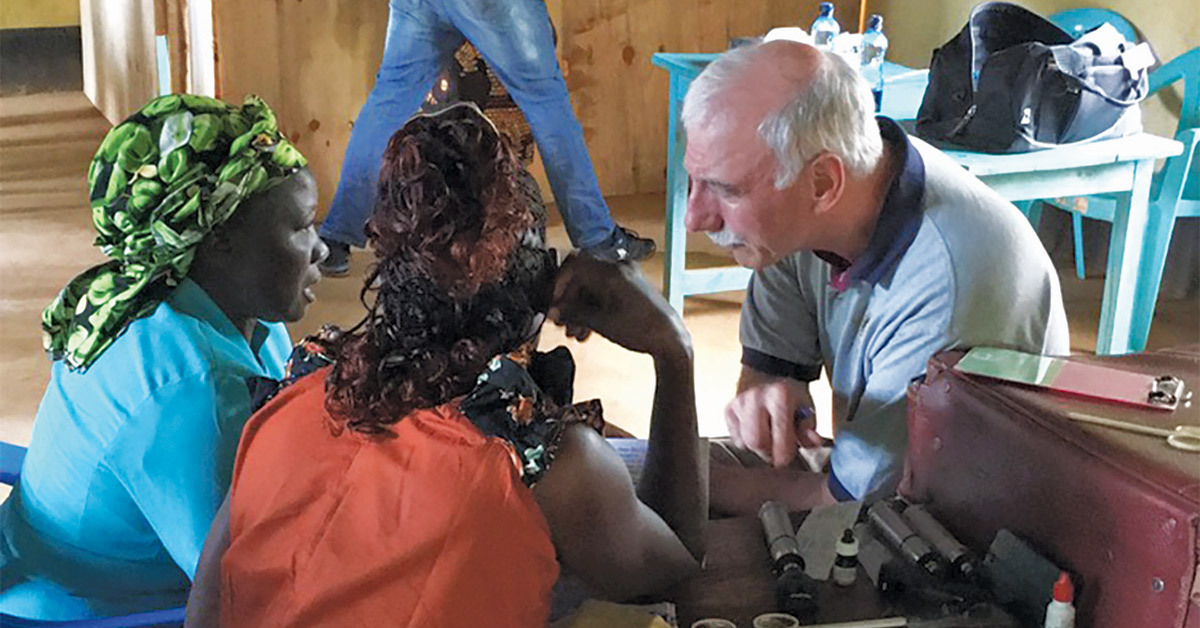
DeHaan meets with patients in need of optometric services in Kenya.
Ellie’s Experience
“My professors got assignments and readings on Blackboard for me before the trip,” Roorda says. “We talked through what class was going to look like before I left and when I came back, and they did all of this for me while they were preparing for and in the middle of finals! The day we left was the first day of Spring 2023 classes.”
The Pella group started in Nairobi, the capital city of Kenya, and met up with the rest of the team there. They had 14 people total — four doctors, some optometric technicians and the rest were volunteers who didn’t know much about optometry but were there to serve. Some had been going for years and several were first-timers like Roorda.
The team had clinic locations in Shikunga and Bungoma, holding three-day clinics in each town.
“The goal was to serve 300 patients per day, but we’d always try to see more than that if we could,” Roorda explains. “The locals in the area knew what we were doing, but there were lots of people who heard through word of mouth and traveled — sometimes walking for hours — to get to the clinic. The hardest thing was turning patients away who showed up at the end of the day. It was heartbreaking. But for the people that we could help, it was truly awesome. In total, we helped 1,811 patients.”
Dispensing Dreams
“The language barrier was difficult,” Roorda admits. “Sometimes we had interpreters, but they weren’t always available as we outnumbered them.”
“Patients would start at registration to record their health history and vitals. From there, they would go to visual acuity to determine near or far-sightedness. After, they would step in front of the autorefractor — which is a machine that scans the patient’s eyes. It speeds up the process so the doctor has an idea of what their prescription could be rather than starting from scratch. After they see a doctor for their eye exam and prescription, they head to the dispensary to receive a pair of glasses.”
On clinic days, Roorda got to do a little bit of several different jobs but spent most of her time in the dispensary.
“We had a computer system we’d plug the prescription into and then a number would pop up to match that prescription as closely as possible. We had about 6,000 pairs of glasses and after 12 years of doing this, the inventory was unorganized. So I’d go searching for the corresponding number and bring three or four pairs of glasses to the patient for them to try on and test out. Unfortunately, we couldn’t always find a pair of glasses that matched patients’ prescriptions. It felt awful to send them away with nothing, so we’d always try to find something.”
“One man had a prescription of -11, which is really high,” she explains. “We didn’t have anything in the computer that matched, so I started searching our inventory and I came across a hot pink pair of children’s glasses. They barely fit his head, but when he put them on, he looked outside and started listing all the things he could see — that was one of the best parts, hearing patients excitedly tell you everything they could see. Some of these patients had never been to an optometrist, so in some cases, people were experiencing things they’d never seen or noticed before.”
“From both faith and educational standpoints, it was just amazing,” Roorda acclaims. “The people there may not have much but they’re so happy, so grateful. Additionally, I learned a lot about optometry, the grad school process and the different optometry schools all the doctors attended. I also made incredible connections. The doctors even offered to write recommendation letters on my behalf. It was so cool to learn about the path I’m pursuing.”
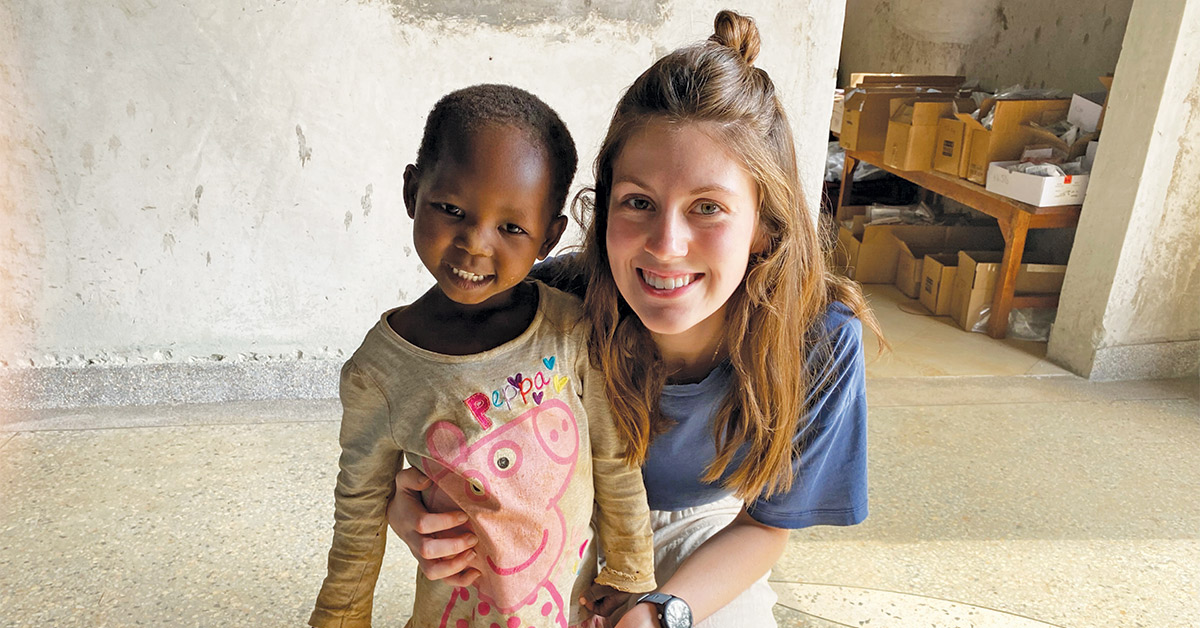
Ellie Roorda ’24 made once-in-a-lifetime memories on the trip — including playing with children of patients while their parents received eye care services.
Central Impressions
The DeHaans were always tied quite closely to Lu Ann’s parents, Harry and Bernice Tromp Vermeer ’50.
“We took quite a few cues from them, seeing the causes that they were supporting and why. One of the organizations they supported happened to be Central,” DeHaan shares. “Through my eye care work in Pella, we certainly noticed a good share of Central students, faculty and staff coming in as patients. We realized Central was a big part of our practice and also that Central is very much an important part of the community. So, over the years, as there were opportunities to participate in things, we did. It just made a lot of sense for us to be supporters of Central.”
“Central contributes to the success of the community. Interacting with students who are going there and those who have graduated from there has introduced me to a lot of high-quality people. As I’ve gotten older, I’ve realized more and more that what you end up supporting is actually you giving money to people. And the people of Central impressed me so positively that I became more and more interested in supporting them.”
One of these impressive people includes Roorda.
“Ellie was upbeat, positive and very helpful on our trip,” DeHaan says. “She would happily do whatever anyone asked her to do. That’s what I had hoped for, and that’s what we got.”
The group doesn’t get as much participation from college students compared to years past due to conflicts with the start of spring semesters. Roorda’s commitment to the work and interest in optometry stuck with DeHaan.
“She did really well and I could tell she enjoyed it all,” he says. “It’s an extremely interesting experience. You’re immersed in another culture completely. Ellie got to be part of that and I think she found it to be a big blessing. The timing of the trip doesn’t really align for college students anymore like it does for doctors, their families and acquaintances. So, I was thrilled when she reached out to me.”
Worth the Work
“It was a lot of preparation,” Roorda shares. “It was nearly a year of planning and preparing — to communicate with whom I needed to communicate, get the vaccines I needed, fund my travel to Kenya and all other expenses and make sure I had everything I needed.”
“Many say they’ll do this someday or do that someday and oftentimes they never get to do it,” she says. “The timing was right for me. Yeah, I sacrificed things on my end missing two weeks of class and indoor track, but it was more than worth it. It was a really good opportunity, not only to serve other people but to also help me stand out to optometry schools. It felt good to have the support of my professors and coaches. They knew this was a once-in-a-lifetime opportunity.”
She’s certainly open to more mission trips like this in the future — next time, as one of the doctors.
“It was just awesome that we were basically all strangers who came together for this common good,” she says.
The group ended the service opportunity with a safari trip to spend time together, reflect and enjoy nature. This provided Roorda with even more memories to carry with her, like waking up to an elephant outside her hut!
“We’re doing this not just as humanitarians, we’re there because we feel God is calling us there to help these people and promote Christianity,” DeHaan says. “I saw faith in action there and it challenged me in my own faith.”
“Trips like this are great for people interested in optometry — they get to see what optometry can do in another country and for others.”
But you don’t have to be an optometry fanatic to join DeHaan and the team. To learn more about SCHOK & AWE or get involved in future service opportunities, visit their website at: schokandawe.org.
Central prepares students for whatever is next, including optometry, dentistry, medicine and other health professions. Help more students realize how they can make a difference in the world by supporting academic programming and student scholarships through the Journey Scholarship Fund! Visit central.edu/journey to show your support today.
Derek DeHaan, former owner of Brand Appeal, contributed to this story.











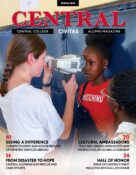
To encourage serious, intellectual discourse on Civitas, please include your first and last name when commenting. Anonymous comments will be removed.